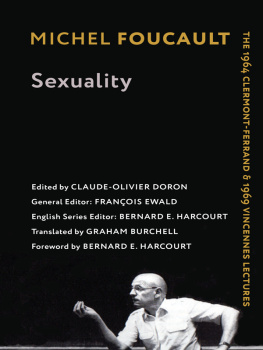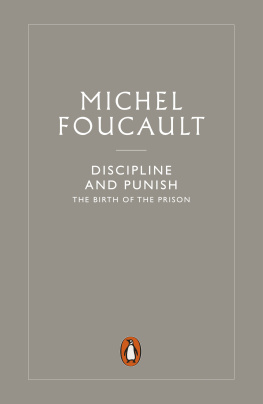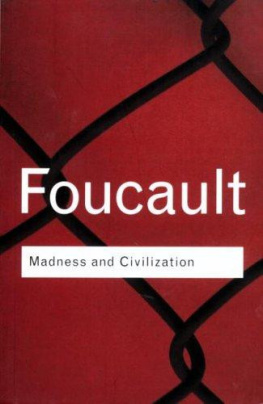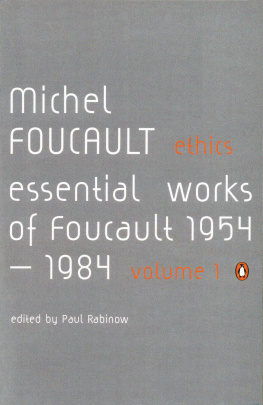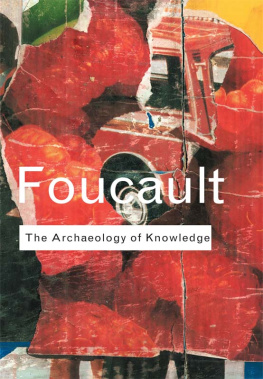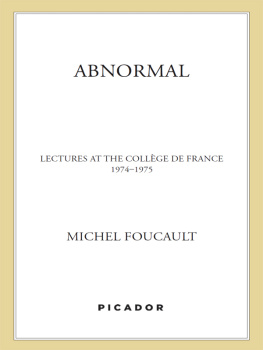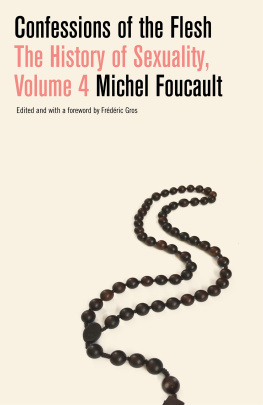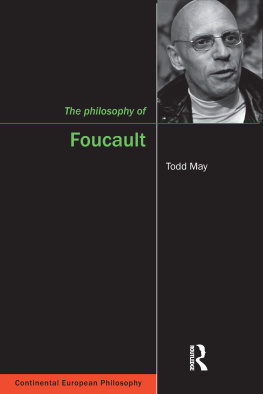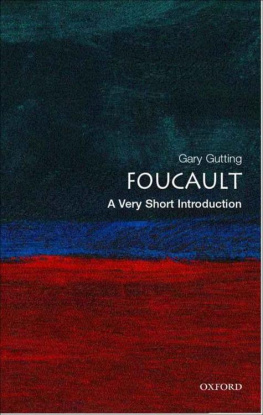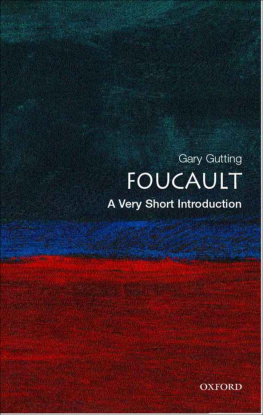Michel Foucault - The History of Sexuality: An Introduction: 1
Here you can read online Michel Foucault - The History of Sexuality: An Introduction: 1 full text of the book (entire story) in english for free. Download pdf and epub, get meaning, cover and reviews about this ebook. year: 2012, publisher: Vintage, genre: Religion. Description of the work, (preface) as well as reviews are available. Best literature library LitArk.com created for fans of good reading and offers a wide selection of genres:
Romance novel
Science fiction
Adventure
Detective
Science
History
Home and family
Prose
Art
Politics
Computer
Non-fiction
Religion
Business
Children
Humor
Choose a favorite category and find really read worthwhile books. Enjoy immersion in the world of imagination, feel the emotions of the characters or learn something new for yourself, make an fascinating discovery.

- Book:The History of Sexuality: An Introduction: 1
- Author:
- Publisher:Vintage
- Genre:
- Year:2012
- Rating:3 / 5
- Favourites:Add to favourites
- Your mark:
- 60
- 1
- 2
- 3
- 4
- 5
The History of Sexuality: An Introduction: 1: summary, description and annotation
We offer to read an annotation, description, summary or preface (depends on what the author of the book "The History of Sexuality: An Introduction: 1" wrote himself). If you haven't found the necessary information about the book — write in the comments, we will try to find it.
The History of Sexuality: An Introduction: 1 — read online for free the complete book (whole text) full work
Below is the text of the book, divided by pages. System saving the place of the last page read, allows you to conveniently read the book "The History of Sexuality: An Introduction: 1" online for free, without having to search again every time where you left off. Put a bookmark, and you can go to the page where you finished reading at any time.
Font size:
Interval:
Bookmark:
Books by Michel Foucault
Madness and Civilization: A History of Insanity in the Age of Reason
The Order of Things: An Archaeology of the Human Sciences
The Archaeology of Knowledge (and The Discourse on Language)
The Birth of the Clinic: An Archaeology of Medical Perception
I, Pierre Rivire, having slaughtered my mother, my sister, and my brother. A Case of Parricide in the Nineteenth Century
Discipline and Punish: The Birth of the Prison
The History of Sexuality, Volumes 1, 2, and 3
Herculine Barbin, Being the Recently Discovered Memoirs of a Nineteenth-Century French Hermaphrodite
Power/Knowledge: Selected Interviews and Other Writings, 19721977

V INTAGE B OOKS E DITION , M ARCH 1990
English translation Copyright 1978 by Random House, Inc.
All rights reserved under International and Pan-American Copyright Conventions. Published in the United States by Random House, Inc., New York, and in Canada by Random House of Canada Limited, Toronto. Originally published in France as La Volent de savoir by Editions Gallimard, Paris. Copyright 1976 by Editions Gallimard. First American edition published by Pantheon Books, a division of Random House, Inc., in November, 1978.
Grateful acknowlegment is made to Doubleday & Company, Inc., for permission to reprint an excerpt from a poem by Gottfried August Burger cited by Arthur Schopenhauer in The Metaphysics of the Love of the Sexes, from The Will to Live: Selected Writings of Arthur Schopenhauer, edited by Richard Taylor.
Library of Congress Cataloging in Publication Data Foucault, Michel.
The history of sexuality
Translation of Histoire de la sexualit.
CONTENTS: V 1 An introduction.
1. Sex customsHistoryCollected works. I. Title
HQ12.F6813 1980 301.417 79-7460
eISBN: 978-0-307-81928-4
v3.1

We Other Victorians
For a long time, the story goes, we supported a Victorian regime, and we continue to be dominated by it even today. Thus the image of the imperial prude is emblazoned on our restrained, mute, and hypocritical sexuality.
At the beginning of the seventeenth century a certain frankness was still common, it would seem. Sexual practices had little need of secrecy; words were said without undue reticence, and things were done without too much concealment; one had a tolerant familiarity with the illicit. Codes regulating the coarse, the obscene, and the indecent were quite lax compared to those of the nineteenth century. It was a time of direct gestures, shameless discourse, and open transgressions, when anatomies were shown and intermingled at will, and knowing children hung about amid the laughter of adults: it was a period when bodies made a display of themselves.
But twilight soon fell upon this bright day, followed by the monotonous nights of the Victorian bourgeoisie. Sexuality was carefully confined; it moved into the home. The conjugal family took custody of it and absorbed it into the serious function of reproduction. On the subject of sex, silence became the rule. The legitimate and procreative couple laid down the law. The couple imposed itself as model, enforced the norm, safeguarded the truth, and reserved the right to speak while retaining the principle of secrecy. A single locus of sexuality was acknowledged in social space as well as at the heart of every household, but it was a utilitarian and fertile one: the parents bedroom. The rest had only to remain vague; proper demeanor avoided contact with other bodies, and verbal decency sanitized ones speech. And sterile behavior carried the taint of abnormality; if it insisted on making itself too visible, it would be designated accordingly and would have to pay the penalty.
Nothing that was not ordered in terms of generation or transfigured by it could expect sanction or protection. Nor did it merit a hearing. It would be driven out, denied, and reduced to silence. Not only did it not exist, it had no right to exist and would be made to disappear upon its least manifestationwhether in acts or in words. Everyone knew, for example, that children had no sex, which was why they were forbidden to talk about it, why one closed ones eyes and stopped ones ears whenever they came to show evidence to the contrary, and why a general and studied silence was imposed. These are the characteristic features attributed to repression, which serve to distinguish it from the prohibitions maintained by penal law: repression operated as a sentence to disappear, but also as an injunction to silence, an affirmation of nonexistence, and, by implication, an admission that there was nothing to say about such things, nothing to see, and nothing to know. Such was the hypocrisy of our bourgeois societies with its halting logic. It was forced to make a few concessions, however. If it was truly necessary to make room for illegitimate sexualities, it was reasoned, let them take their infernal mischief elsewhere: to a place where they could be reintegrated, if not in the circuits of production, at least in those of profit. The brothel and the mental hospital would be those places of tolerance: the prostitute, the client, and the pimp, together with the psychiatrist and his hystericthose other Victorians, as Steven Marcus would sayseem to have surreptitiously transferred the pleasures that are unspoken into the order of things that are counted. Words and gestures, quietly authorized, could be exchanged there at the going rate. Only in those places would untrammeled sex have a right to (safely insularized) forms of reality, and only to clandestine, circumscribed, and coded types of discourse. Everywhere else, modern puritanism imposed its triple edict of taboo, nonexistence, and silence.
But have we not liberated ourselves from those two long centuries in which the history of sexuality must be seen first of all as the chronicle of an increasing repression? Only to a slight extent, we are told. Perhaps some progress was made by Freud; but with such circumspection, such medical prudence, a scientific guarantee of innocuousness, and so many precautions in order to contain everything, with no fear of overflow, in that safest and most discrete of spaces, between the couch and discourse: yet another round of whispering on a bed. And could things have been otherwise? We are informed that if repression has indeed been the fundamental link between power, knowledge, and sexuality since the classical age, it stands to reason that we will not be able to free ourselves from it except at a considerable cost: nothing less than a transgression of laws, a lifting of prohibitions, an irruption of speech, a reinstating of pleasure within reality, and a whole new economy in the mechanisms of power will be required. For the least glimmer of truth is conditioned by politics. Hence, one cannot hope to obtain the desired results simply from a medical practice, nor from a theoretical discourse, however rigorously pursued. Thus, one denounces Freuds conformism, the normalizing functions of psychoanalysis, the obvious timidity underlying Reichs vehemence, and all the effects of integration ensured by the science of sex and the barely equivocal practices of sexology.
This discourse on modern sexual repression holds up well, owing no doubt to how easy it is to uphold. A solemn historical and political guarantee protects it. By placing the advent of the age of repression in the seventeenth century, after hundreds of years of open spaces and free expression, one adjusts it to coincide with the development of capitalism: it becomes an integral part of the bourgeois order. The minor chronicle of sex and its trials is transposed into the ceremonious history of the modes of production; its trifling aspect fades from view. A principle of explanation emerges after the fact: if sex is so rigorously repressed, this is because it is incompatible with a general and intensive work imperative. At a time when labor capacity was being systematically exploited, how could this capacity be allowed to dissipate itself in pleasurable pursuits, except in thosereduced to a minimumthat enabled it to reproduce itself? Sex and its effects are perhaps not so easily deciphered; on the other hand, their repression, thus reconstructed, is easily analyzed. And the sexual causethe demand for sexual freedom, but also for the knowledge to be gained from sex and the right to speak about itbecomes legitimately associated with the honor of a political cause: sex too is placed on the agenda for the future. A suspicious mind might wonder if taking so many precautions in order to give the history of sex such an impressive filiation does not bear traces of the same old prudishness: as if those valorizing correlations were necessary before such a discourse could be formulated or accepted.
Next pageFont size:
Interval:
Bookmark:
Similar books «The History of Sexuality: An Introduction: 1»
Look at similar books to The History of Sexuality: An Introduction: 1. We have selected literature similar in name and meaning in the hope of providing readers with more options to find new, interesting, not yet read works.
Discussion, reviews of the book The History of Sexuality: An Introduction: 1 and just readers' own opinions. Leave your comments, write what you think about the work, its meaning or the main characters. Specify what exactly you liked and what you didn't like, and why you think so.

